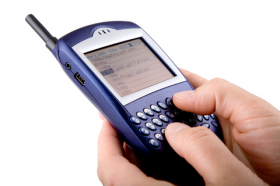Brand
Business
Leadership

“This book tells you all you need to know about how to get on.” The Times
“Relatively few books have been written with assistant solicitors in mind, about how to succeed at the business of being a lawyer… fewer still have devised a programme for so doing that runs alongside a book. This book does both.”Law Society (The Law Management Section)
5 star rating HR Magazine
 As lawyers we communicate in a wide range of circumstances and with any number of methods. The thing to remember is that every single communication - answering the telephone, leaving a voicemail, or sending an email - conveys your brand. At the risk of stating the obvious, let me remind you of some simple truths.
As lawyers we communicate in a wide range of circumstances and with any number of methods. The thing to remember is that every single communication - answering the telephone, leaving a voicemail, or sending an email - conveys your brand. At the risk of stating the obvious, let me remind you of some simple truths.
Email. Never, ever treat email casually! It’s the communication tool of our generation, and while it’s tempting to see it as delightfully informal, in business terms you must not allow this to happen. Emails should be crafted, written, polished, and finally proofread with exactly the same care as a formal letter. Failing in this area will suggest that you are indolent and slapdash - someone who can’t be bothered to get it right. Also, always be specific in the subject line, and never reply to a previous message that has an irrelevant subject line to the topic at hand. And last (but definitely not least), always check that you’re responding to the right person!
Telephone. When on the phone, of course, your voice tells the story, so keep it upbeat, relaxed, and friendly. Even if your girlfriend just walked out on you, you’ve smashed up a (borrowed) car, and your central heating has chosen the coldest day of the year to break down, try smiling while you talk! Remember that if you act it, you become it, even if just for the duration of the call! (Afterwards you can howl, if you really need to.) Another tip worth trying is standing up; oddly enough, this can make you sound more alert and confident. And as with any communication, be sure to limit your message to essentials and avoid wandering off the topic. (It's always a good idea to assume that the person on the other end has an urgent meeting to attend, which in many situations will be the case.)
When initiating a call, always ask the recipient immediately whether or not "now" is a good time for him. Before calling, have your thoughts organized and know your objective, so you can get to the point as soon as possible after any inevitable pour-parlers. This is still more important if your call is transferred to voicemail, and you have to get your immediate point across concisely. If you have to leave a message, state your phone number clearly and audibly so that the other person can retrieve it easily. Failing to do so cruelly reduces the chances of your call being returned. No one wants to replay a message five times to obtain the whole number or to distinguish "five" from "nine".
Your outgoing message. One great habit to acquire is changing your office voicemail every day. I can always count on knowing my friend Rachel’s whereabouts through her voicemail. Typically, she’ll say: "Hi, this is Rachel. Today is Friday, the ninth. I will be in the office all morning except for a meeting between 10:00 and 11:00. From 1:00 on, I will be out of the office and unavailable. I hope to return around 5:00 p.m. Please leave a message, and I’ll be sure to get back to you as soon as possible." As a friend, I appreciate knowing when I can reach Rachel, but I suspect that her clients value this even more, as just another example of her detailed professionalism.
Posted on 15/12/2009